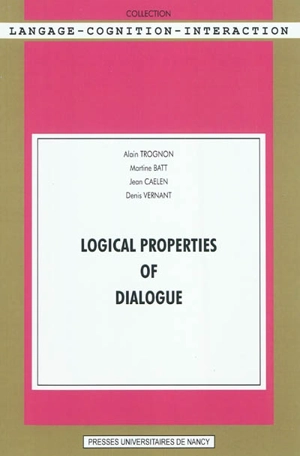
Logical properties of dialogue
Versailles, Lyon 2ᵉ, Lyon 6ᵉ...
Ce que dit l'éditeurA little more than twenty-five years ago, Douglas Walton (1985) prefaced a special issue of the journal Synthèse on new directions in dialogue logic, with this provocative question : « But is there a logic of dialogue ? », while commenting that « quite recently it has become apparent that there is a serious mainstream interest in studying the logical structure of dialogue. » For Walton, these developments were « already leading towards a reversal of the orientation of logic ». But this reversal will appear more difficult and chaotic than Walton had enticipated it. In a second special issue of the same journal, Synthese, devoted to dialogue logic published 15 years after the 1985 issue, Rahman and Rücker (2001) - who noted that « The three approaches [that make up of the dialectic renewal of dialogue logic] [...] followed separate paths and with some occasional exceptions did not actually pool their result in a common project » (Rahman & Rücker, 2001 : 1). They also said « quite recently it has become apparent that there is a gradually increasing interest in the study of dialogical logic from different research areas. Several factors are responsible for this new impulse which has a sharpened focus in computer science and artificial intelligence. Let us delineate some of these factors : A new demand for a diversity of logical systems which could serve various applications has arisen from artificial intelligence, computer science and linguistics, as well as from legal reasoning, philosophy and psychology. This demand has caused extensive research in different new and old logical systems. (ibid : 1-2). They conclude that « the question of how a common general frame for studying most of these logics could be formulated was now of particular importance. » Would not it anything be spent of fundamental in the logic of the dialogue between 1985 and 2001 ? And if significant progress was carried out, what tasks do they remain to make to approach the synthesis for which Krabbe hoped in its article in 1985 ? Such is the theme of this book to which contributed the best French specialists of the dialogue. |
RésuméApproche logique du dialogue et des modèles dialogiques à la caractéristique commune de pouvoir servir d'outil d'analyse à des corpus issus de situations réelles et d'activités très variées. ©Electre 2026 |
Caractéristiques Éditeur(s) Date de parution
25 mars 2011
Collection(s)
Langage, cognition, interaction
Rayon
Linguistique française et étrangère
Contributeur(s) Alain Trognon
(Directeur de publication), Martine Batt
(Directeur de publication), Jean Caelen
(Directeur de publication), Denis Vernant
(Directeur de publication) EAN
9782814300422
Nombre de pages
225
pages
Reliure
Broché
Dimensions
24.0
cm x
16.0
cm x
cm
Poids
385
g
|
